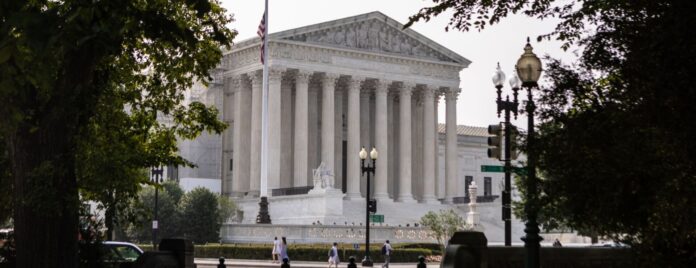The US Supreme Court is grappling with finding a balance between free-speech principles and the internet, as they consider laws supported by the Republicans that would greatly limit the editorial discretion of major social media companies.
During a nearly four-hour session on Monday in Washington, justices across the court’s ideological spectrum indicated hesitation in completely striking down the new laws in Texas and Florida, a move sought by trade groups representing Meta Platforms Inc.’s Facebook and Alphabet Inc.’s Google.
However, a majority of the justices also raised concerns about how the core provisions of the laws would impact the removal of hate speech and misinformation, as well as the blocking of users who violate the platforms’ terms of service.
These conflicting views have left the court uncertain about how to proceed with cases that Justice Amy Coney Barrett described as having potential unforeseen implications. The court may choose to send the laws back to lower courts rather than making a final decision, with an opinion expected by June. Both laws are currently on hold.
Companies argue that the laws would impose burdensome requirements and make sites vulnerable to spam and bullying. On the other hand, supporters of the laws, including Florida Governor Ron DeSantis and Texas Governor Greg Abbott, believe they are necessary to prevent discrimination against conservative voices.
The laws were enacted in response to decisions by some platforms to remove former President Donald Trump following the Jan. 6, 2021 Capitol attack.
Justice Clarence Thomas supported the measures, stating that social media companies engage in censorship. “I don’t know of any protected speech interest in censoring other speech,” he remarked.
‘Public Square’
Chief Justice John Roberts suggested that viewing the issue through the lens of the First Amendment, which applies to the government but not private parties, might be misguided. “I wonder if, since we’re discussing the First Amendment, our primary concern should be with the state regulating what we call the modern public square,” Roberts stated.
The 11th US Circuit Court of Appeals in Atlanta temporarily blocked most of Florida’s law for likely violating the First Amendment. In contrast, the 5th Circuit in New Orleans upheld the Texas law, though the law is currently suspended.
Much of the discussion revolved around procedural questions, with several justices questioning the trade groups’ decision to pursue “facial” challenges, typically requiring a litigant to demonstrate that all aspects of the law are unconstitutional.
Justice Ketanji Brown Jackson asked lawyer Paul Clement, representing the trade groups, why they wouldn’t lose if some scenarios existed where the anti-discrimination provisions could be constitutionally applied to tech services like Google’s Gmail or Uber Technologies Inc.’s ride-sharing platform.
Justice Samuel Alito questioned whether the tech industry would argue that Gmail could exercise a First Amendment right to remove account holders such as GOP commentator Tucker Carlson or liberal journalist Rachel Maddow based on their political views. Clement responded, “They might be able to do that, your honor.”
The centerpiece of the Texas law is a provision barring large platforms from discrimination based on viewpoint, with exceptions for content encouraging violence, criminal activity, sexual exploitation of children, or harassment of abuse survivors.
The Florida law includes multiple provisions, including a requirement for platforms to provide a detailed rationale for each content moderation decision.
The Florida case is Moody v. NetChoice, 22-277. The Texas case is NetChoice v. Paxton, 22-555.
To contact the reporters on this story:
Emily Birnbaum in Washington at [email protected]
To contact the editors responsible for this story:
Elizabeth Wasserman at [email protected]
Sara Forden
© 2024 Bloomberg L.P. All rights reserved. Used with permission.
